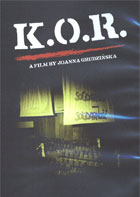
K.O.R. 2009
Distributed by Icarus Films, 32 Court St., 21st Floor, Brooklyn, NY 11201; 800-876-1710
Produced by Joanna Grudzinska
Directed by Joanna Grudzinska
DVD, color and b&w, 56 min.
High School - General Adult
European Studies, History, Human Rights, Political Science
Date Entered: 07/08/2011
Reviewed by Rebecca Adler Schiff, College of Staten Island, City University of New YorkIn June 1976, the Communist government of Poland announced an onerous rise in food prices that brought protesters out into the streets; the protests, needless to say, led to mass arrests and firings of workers in the so-called people’s republic. Significantly the crackdown also led to the formation of an underground workers support organization, the Workers Defense Committee, or K.O.R., the first initials of its Polish name. For five eventful years, K.O.R. provided aid and legal assistance to workers in need; published an underground newspaper, Robotnik, which ran stories not covered in the government controlled press; came up with a Charter of Workers Rights (which included not only the banned right to strike, but a set of ethical demands on workers as well); brought together for the first time in that communist land an alliance of workers and intelligentsia that eventually led to the toppling of the one party regime. In fact K.O.R. counted one Lech Walesa among its members when workers in the Gdansk shipyards, with Robotnik’s support, went on strike in June 1980. The strike of course led to Walesa’s co-founding of the better known Solidarnosc, the rest is Polish history…. Now, some thirty years after its voluntary absorption into Solidarnosc, Joanna Grudzinska’s film brings together, three of K.O.R.’s founding and most active members, Jan Litynski, Henryk Wujec, and Joanna Szczesna, to tell the story of an organization that was truly Solidarnosc in embryo. With almost no contemporary footage to go by, the film relies on its protagonists’ recollections, dozens of still photos, readings from issues of Robotnik, and prose paragraphs on an otherwise black screen to advance the story. Nevertheless – and this is one of the film’s chief strengths – the portraits of Litynski, Wujec and Szezesna that emerge are strangely, admirably powerful – in their subjects’modest heroism, in their profound humanity. Indeed, rare for a documentary of this type, the camera often lingers on a face or on a full body posture long after absolutely necessary to give you a more intimate sense of these otherwise nondescript beings who helped bring down a seemingly invincible totalitarian regime. Grudzinska’s film radiates the very purest kind of idealism – in all directions. An unavoidable regret for non-Polish speakers, however, is that the present film’s soundtrack is, as it should be, in the original Polish, together with English subtitles. It becomes obvious pretty quickly into the film, though, that the titles cannot keep up with the Polish – in fact, one might put the ratio of spoken Polish to subtitled English at about three to one. All of which is more than a disappointment, given the fundamental importance of dialogue in the film. Perhaps the distributor might consider supplying, along with copies of the film, a transcript in English of the Polish any Anglophone audience would benefit from having.